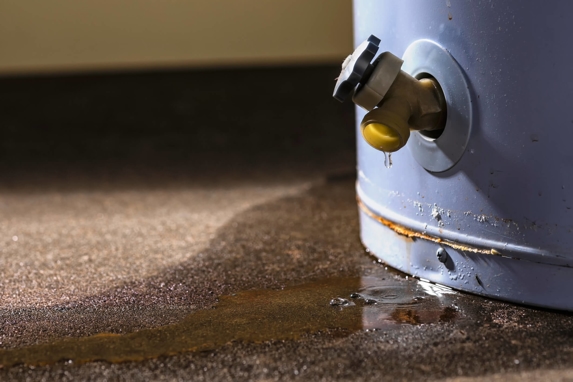If you see water on the outside of your gas water heater, there are two likely reasons for it. Either there’s a leak, or your water heater has released condensate. It’s critical to determine which of the two it is. While condensation is not always a significant problem, a leaky water heater definitely is. In some cases, the leak can be repaired. In others, you’ll need a completely new water heater.

What Causes Water Heater Condensation
Let’s travel back in time to science class. Remember three things:
- Water can be liquid, gas, or solid.
- The dew point is the temperature at which water in gas form (water vapor) turns to water in liquid form (condensate).
- Once water vapor gets colder than the dew point, it changes into condensation.
Here is what this has to do with your water heater:
- A lot of moisture gets released in gas water heaters when natural gas or propane burns.
- If the main burner is on and producing hot flue gases when cold water enters your water heater and its piping, two things happen: the water makes the tank’s piping and heat transfer surfaces cooler, and then that makes the hot flue gases condensate.
It’s not uncommon for condensate to show up on gas water heaters after they’re filled with cold water for the first time. Your water heater might also release condensate if you’ve just used a lot of hot water and the water refilling the tank is really cold.
In some cases, condensation can indicate that the unit’s temperature setting is too low, in which case, you only need to increase your water heater’s temperature. Condensation can also occur if your water heater is too small to meet your home’s hot water needs, which causes it to need frequent refilling with cold water.
How to Check for a Leak vs. Condensation
Follow these steps to determine if your water heater is leaking or if the water you see is only condensate.
- Wipe away all the water underneath your water heater, if there is any.
- Find your water heater’s thermostat and turn the knob to the pilot position.
- Wait up to one day, checking every few hours to see if any water has collected under the unit. Once the water heater passes 110 degrees Fahrenheit, there shouldn’t be any more condensation.
- If there isn’t any water under the unit, then you know it was just condensation. If you do find water, you know there’s a leak somewhere.
If you’ve discovered that your water heater is leaking or if you find that your water heater frequently “sweats,” it’s best to involve a water heater specialist. While condensate may not pose an immediate problem the way a leak does, excessive condensation can lead to pilot light outages and cause your water heater to corrode prematurely.
For 24/7 water heater repair from reliable, experienced professionals, contact Payless Water Heaters: (866) 615-4008. Because we specialize in water heaters, we routinely save our customers hundreds of dollars compared to traditional plumbers, and we never charge overtime fees.



